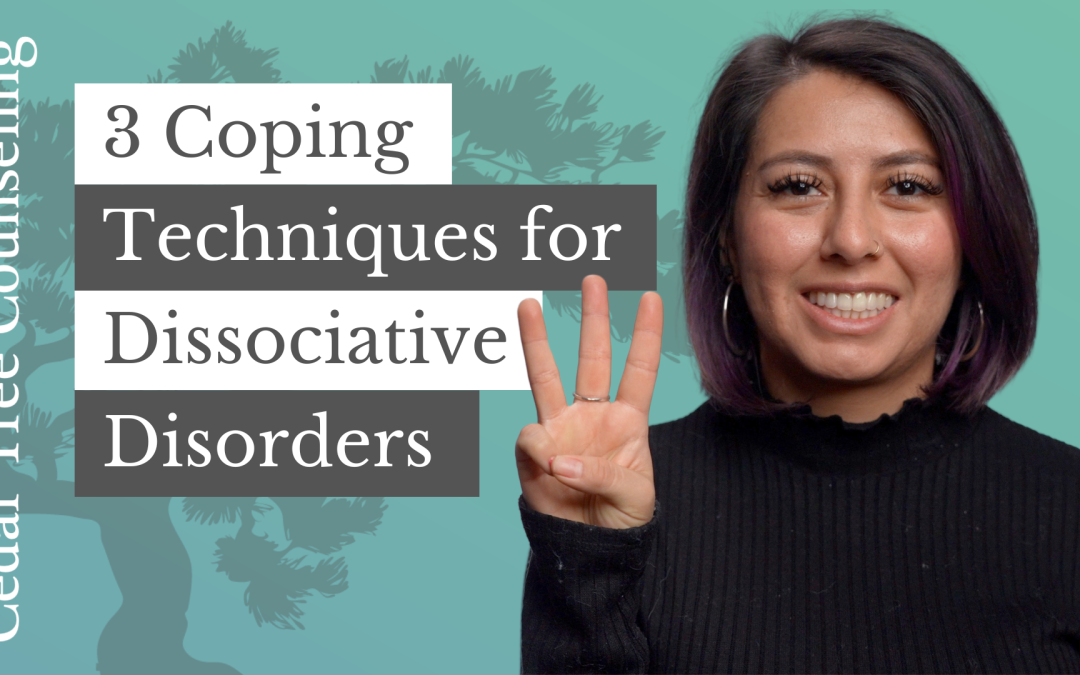Dissociative disorders, characterized by involuntary disconnections from thoughts, memories, or sense of identity, can leave individuals feeling lost. Daily life can be a confusing and overwhelming experience, making it crucial to equip yourself with effective coping skills.
Hi, I’m Valeria Walsh, a Marriage & Family Therapist at Cedar Tree Counseling and in this article, we’ll explore 3 practical techniques that can help you navigate the challenges of dissociation.
Common Dissociative Disorders are derealization or depersonalization, dissociative identity disorder, and dissociative amnesia.
Okay, let’s jump into the 3 practical techniques.
1. Practice Grounding Techniques
When dissociation strikes, feeling disconnected from your body is common. Grounding techniques bring your awareness back to the present moment and can anchor you to yourself.
An example of a grounding technique to try is the 5 Senses Exercise.
Engage your senses of sight, smell, touch, taste, and sound. That can include noticing colors and shapes around you, smelling aromatherapy oils, touching or holding a textured object, tasting a piece of fruit or candy, and focusing on specific sounds in your environment.
By actively engaging your senses, you pull yourself back into your body and the present moment.
2. Try Journaling
It can be difficult to process and understand your emotions because dissociation is like putting up a mental barrier that numbs your feelings and blurs your memories. This can make it hard to recognize and understand your emotions. It’s a common response to stress, often leaving you feeling out of touch with how you truly feel.
Journaling, however, can be a powerful tool for exploring your thoughts and feelings, even when you feel fragmented or confused.
Write down whatever comes to mind, without judgment, and allow yourself to express your emotions freely. This can help you gain clarity and insight into your inner world.
3. Build a Support System
Living with a dissociative disorder can be isolating, but reaching out for support is crucial.
Consider joining a support group specifically for individuals with dissociative disorders or seeking help from a trained therapist. A therapist can provide valuable guidance and support as you develop effective coping skills and learn to manage your symptoms.
Remember, coping with dissociation is a journey, not a destination. Be patient with yourself, celebrate your small victories, and if you find that you need additional support, don’t hesitate to reach out and schedule an appointment with us today. We’re here to help.

Valeria Walsh
Adolescents, Adults & Couples
I specialize in helping teens, individuals, and couples find balance and renewed connection with themselves and important relationships, using evidence-based practices to create a safe and nurturing space for healing and growth.
Choose A Topic!
Cedar Tree's Mission:
There are a lot of broken families who struggle to do life well together.
That’s why we help families create an environment where deeper connection & healing can happen.
GENEVA OFFICE
2172 Blackberry Drive, Suite 202
Geneva, IL 60134
(630) 797-9872
*By Appointment Only*
HINSDALE OFFICE
15 Spinning Wheel, Suite 125
Hinsdale, IL 60521
(630) 797-9872
*By Appointment Only*


